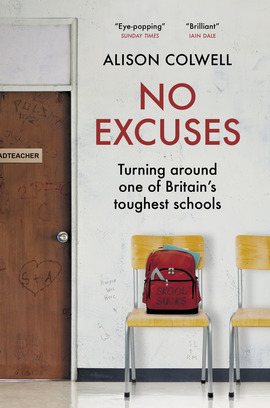We catch up with author of No Excuses, Alison Colwell, on everything education.
Why did you want to write this book?
I wanted to write the book predominantly to highlight great schools, great teachers and great kids. I also thought that I had an awful lot of material to put in and which needed to be out there, which was proved to be true! There was so much I had to omit because school life – especially in challenging schools – is always, always, eventful, fun, demanding, funny, touching and memorable; never dull. It may seem strange to say I wanted to encourage teachers into the profession – or to stay in it – when there’s so much in the book that is tough and at times very sad, but I did. Despite all the challenges it’s a brilliant profession and calling. I want teachers to remember that. I get so disappointed when I hear weary cynicism or lazy criticism. Let’s change things from the inside.
What exactly can teachers (or aspiring teachers) learn from your story?
I believe the ten lessons in leadership can be read and understood by anyone, at any stage of their career, as I do for the ten lessons in turning around failing schools.
There are nuggets of advice and hope that people can take away. I want teachers to know it’s schools that create culture, not students. That if you’re asked to do unreasonable, unnecessary and at times just downright silly things by your school’s leadership, then you should change schools, not professions.
I hope that on a cold Tuesday in November you remember the reasons you (hopefully) went into teaching – love of subject, love of children, passion for education, a desire to inspire and make a difference. That you hold true to that.
And ultimately, common sense is everything!
Which three leadership qualities are vital in transforming a school?
Authenticity. Tenacity. Positivity. Although there are many more! And probably even more important than any of those is the ability to build a team around you who are utterly aligned to the values you hold dear; who have sky-high expectations in all things; who care, are loyal; who are determined and resilient, compassionate but uncompromising; and who have a really good sense of humour.
What are the systemic issues in Britain’s education system?
I feel very passionately – as you’ll know from the book – that all schools should be outstanding and that the inbuilt inequalities that are there from both selective and private education really conspire against this becoming a reality. If everyone from Prime Ministers to monarchs to MPs to CEOs sent their children to their nearest, inclusive, comprehensive school, they’d have genuine investment in ensuring all schools were world class. Also, even though I’m quite a traditionalist, the exam system definitely needs an overhaul.
What do schools really need from the Department of Education?
The single biggest problem, in my view, lies in teacher recruitment, and I include in that retention, obviously. The DoE should do more to promote teaching, but they should do so with authenticity and honesty, not just glossy ads. They need real school leaders involved. That said, I also get frustrated when I hear teachers on radio phone-ins berating various things that go on in their school that are single-handedly down to the leadership in that school, not the DoE.
No Excuses is out in paperback on 28 March.

